5 Teams That Could Win the 4×200 Free Relay at Men’s NCAAs
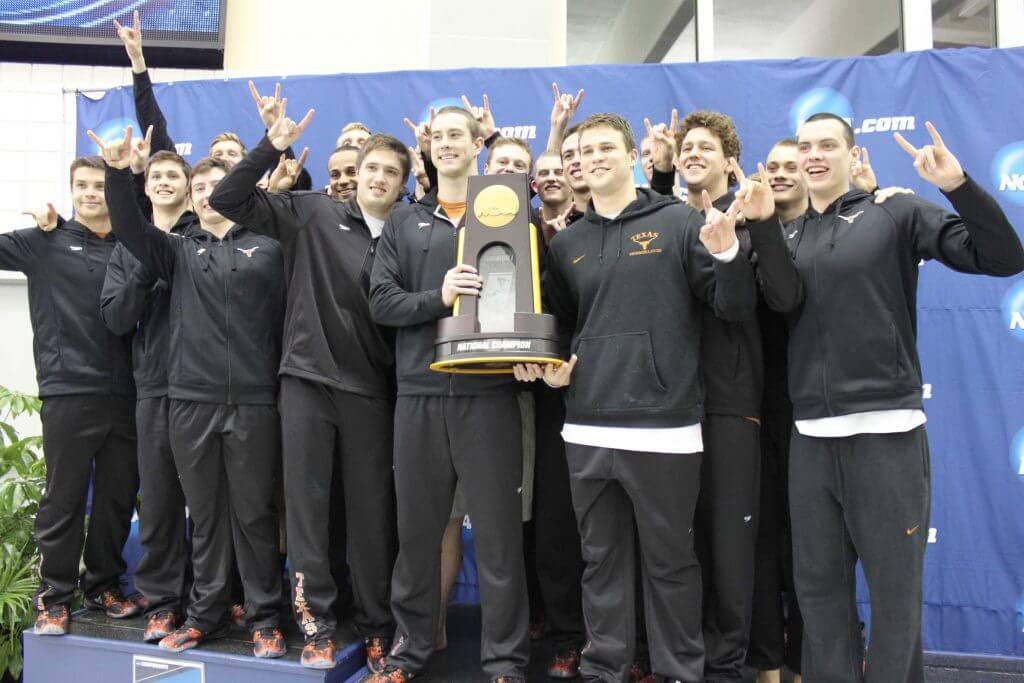
by Robbie Dickson, Swimming World College Intern.
Last year at the 2016 NCAA Championships, the Texas Longhorns broke the NCAA record in the 4×200 free relay led by the monstrous split of 1:30.54 from Townley Haas. This year the Longhorns will return all four from their record relay, but should not expect the rest of the country to roll over and let them have it. Here are the five teams that have a chance to claim the 2017 NCAA title in Indianapolis.
1. The University of Texas Longhorns
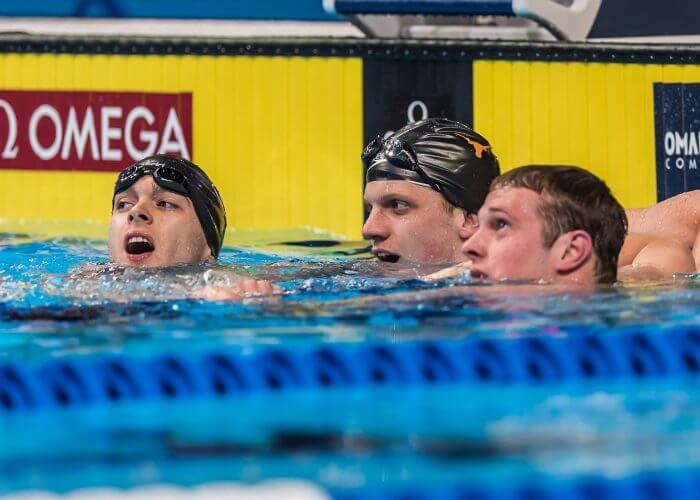
Photo Courtesy: Peter H. Bick
Eddie Reese will have no issue finding the four members of his relay because all members of his 2016 winning team will be back. Jack Conger (USA), Townley Haas (USA), Clark Smith (USA), and Joseph Schooling (Sin) all represented their respective countries this past summer at the Olympic Games. Conger and Smith swam on the prelim 4×200 relay team for the Americans, and Haas swam the fastest split in the field at finals where the Americans went on to win the gold medal. Schooling on the other hand won the gold medal in the 100m butterfly, upsetting the greatest Olympian of all time, Michael Phelps. With all the success these Longhorns had this past summer, they will be the obvious favorites to defend their title in 2017.
2. University of Florida Gators
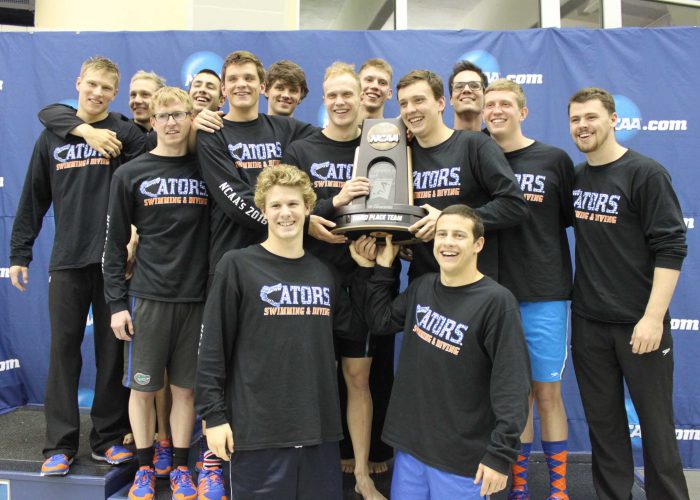
Photo Courtesy: Andy Ringgold / Aringo Photos
While Caelab Dressel stole the show at the 2016 NCAA championships with his jaw-dropping 50 and 100 freestyles, the Gators’ 4×200 free relay finished third, just under two seconds behind the winning Longhorns. The Gators lose Pawel Werner (1:33.11 lead-off), but they do get high-school phenom Maxime Rooney. Rooney’s best flat start is 1:33.70 from this past May, so look for him to be an instant factor on this relay. Other than the loss of Werner, they will return Jan Switkowski (1:31.33), Mitch D’Arrigo (1:32.69), and Mark Szaranek (1:32.71). The Gator men could surprise everyone in March, especially if Gregg Troy is able to take Rooney to the same superstar level as Dressel.
3. Cal Berkeley Golden Bears
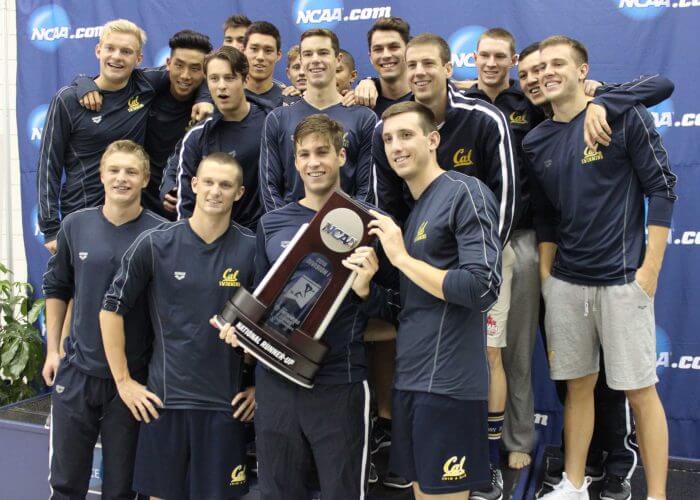
Photo Courtesy: Andy Ringgold / Aringo Photos
Dave Durden‘s Golden Bears certainly performed well above expectations this past summer in Omaha, with six Bears qualifying for the United States Olympic Team. It is hard not to assume that this success will not translate over to the rest of the team. Although they lose Jacob Pebley and Trent Williams to graduation, freshmen Michael Jensen and ‘Aukia Lilkeikis seem like very suitable replacements. Jensen comes into the Bay Area with a best of 1:33.90, and has already gone 1:36.26 in a dual meet. Lilkeikis comes in with a best of 1:34.82, and will definitely help the Bears contend for the relay crown. If this summer foreshadows things to come, no one is safe when the Bears hit the water.
4. Southern Cal Trojans
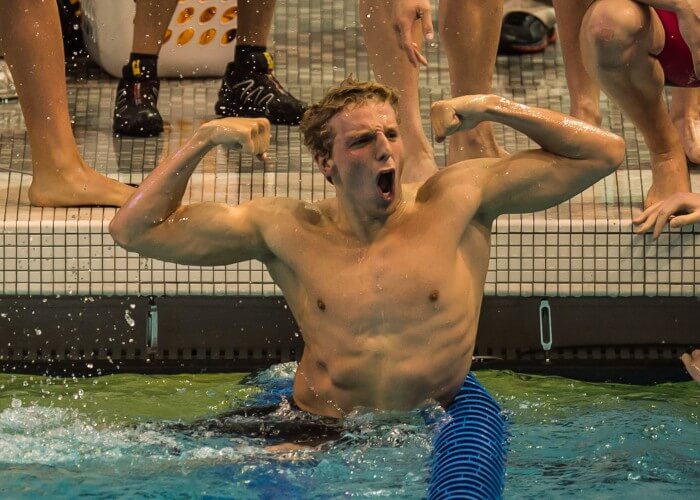
Photo Courtesy: Peter H. Bick
The 4×200 free relay kings in 2015 fell all the way to 9th at this past NCAAs. This is due, in part, to the redshirt of Dylan Carter. Carter redshirted last year in order to prepare for the Olympics. With his return for the 2016-17 season, the Trojans will have 3/4 of their championship relay from 2015. Last year, Morton Klarskov was the slowest split at 1:36.86, and has now graduated. The Carter-Klarskov swap makes for about a four-second difference in just one leg. The other two members from the 2015 team are Michael Domagala and relay stud Reed Malone (who has dropped sequential 1:31 splits at NCAAs). Patrick Mulcare is the likely last member of the quartet as he led off the NCAA relay in a very formidable 1:34.16.
5. The Stanford Cardinal
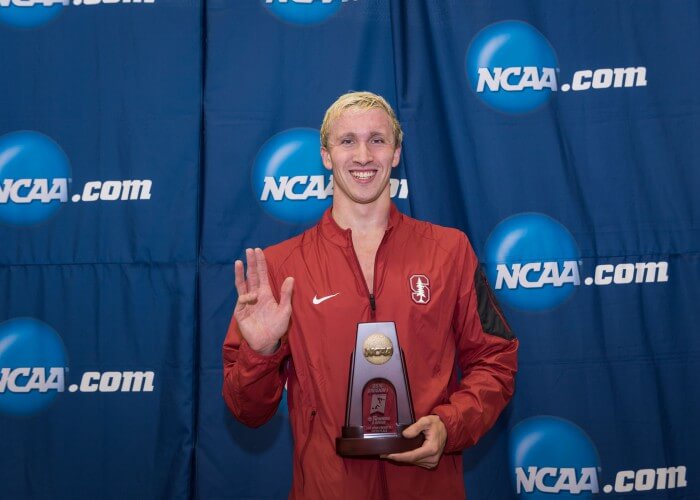
Photo Courtesy: Reagan Lunn/Georgia Tech Athletics
Stanford has not found themselves atop the podium in the 4×200 free relay since 1992, but 2017 could end that drought. The Cardinals lost 75 percent of their 2016 team, with Liam Egan being the sole returner. Egan split a 1:33.5 at the Pac-12 Championships this past season. They will gain Tom Kremer (a career best flat start of 1:33.07) who took the year off to train with coach Bob Bowman at Arizona State. Freshman James Murphy (1:35.7) will likely be added to the relay, and will be a key leg for the Cardinal. But the biggest pick-up for Stanford is freshman Grant Shoults. Shoults has a best of 1:33.26 and could provide Stanford with the fire-power they need in order to shock the NCAA and capture the title.
Note: NC State has finished second in this event the past two NCAAs, but lost Simonas Bilis (1:32.02 lead-off) to graduation. Not to say the Wolfpack will not develop someone over the course of the year to fill the gap, but it will definitely be a challenge.
All commentaries are the opinion of the author and do not necessarily reflect the views of Swimming World Magazine nor its staff.




5? I think you mean 1.
What about UGA? Bentz, Jay Litherland, Pace Clark, and Kalisz seems to easily be a top 5 relay.